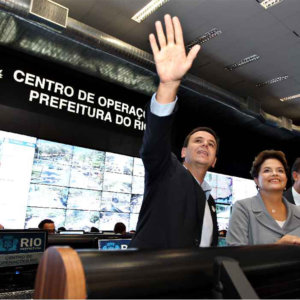Smart Cities and Economic Development: What to Consider
As metropolitan areas across the globe embark on “smart city” initiatives, new research points to areas of concern — and provides recommendations to move forward.
Topics
Competing With Data & Analytics
Rio de Janeiro is one of a growing number of cities that want to become smarter about what is happening and is about to happen within their city limits. “Smart cities” are popping up around the globe — from China, where 193 smart cities are being piloted as part of the country’s urban renewal plan, to Europe, the U.K., and the U.S. The development of smart cities involves a wide scope of technology, everything from renewable energy, green buildings and smart grids to traffic management, urban security and medical technology.
Beneath the giant Christ the Redeemer statue that towers over the City, the “Centro De Operacoes Prefeitura Do Rio,” [Rio Operations Center] monitors the life of the city in real time, 24 hours a day — everything from the traffic on main roads (with hundreds of live cams), to the city’s social mood, to the weather. It takes 400 professionals working in three shifts around the clock to help process and integrate information from 30 different government agencies. Data is visualized on an 80-square-meter screen in a central control room.
The goal: urban sustainable development and economic growth. Opportunities abound for businesses and entrepreneurs to be part of this global urban revitalization effort. The question is, what are the management risks of more smart cities?
A recent paper, The Real-Time City? Big Data and Smart Urbanism developed by Rob Kitchin, a researcher at the National University of Ireland Maynooth, County Kildare, Ireland, raises three concerns regarding managing smart cities:
- Technocratic governance: Smart-city proposals are based on an approach that is narrow in scope, reductionist and functionalist, derived from a limited set of particular kinds of data. They fail to take into account the wider effects of culture, politics, policy, governance and capital that shape city life and how it unfolds. At the same time, command systems centralize power and decision making into a select set of offices and make elements of data publicly available.
- “Corporatization” of city government: Smart-city agendas and associated technologies are being heavily promoted by a number of the world’s largest software services and hardware companies. This creates several concerns: that public services are administered for private profit; that it creates a technology lock-in that shackles cities to particular technology platforms and vendors; and that there will be “one-size-fits-all smart-city-in-a-box” solutions that take little account of the uniqueness of places, people and cultures and straitjackets city administrators.
- Panoptic cities: Big data and data-control centers that integrate and bind data streams together work toward moving various systems into a single, panoptic vantage point. This single vantage point raises “the specter of a Big Brother society based on a combination of surveillance and ‘dataveillance.’”
Kitchin isn’t recommending the abolition of smart cities. Rather, he suggests a balance: that smart city technology be complemented with a range of other “instruments, policies and practices that are sensitive to the diverse ways in which cities are structured and function.” He argues for citizens’ rights to privacy in the face of unrelenting data and image surveillance.
In a long and thought-provoking essay on smart cities, Anthony Townsend, research director at the Silicon Valley-based Institute for the Future, and senior research fellow at New York University’s Rudin Center for Transportation Policy and Management, wonders about the sheer “bugginess” of smart cities. He writes:
Smart cities are almost guaranteed to be chock full of bugs, from smart toilets and faucets that won’t operate to public screens sporting Microsoft’s ominous Blue Screen of Death. But even when their code is clean, the innards of smart cities will be so complex that so-called normal accidents will be inevitable. The only questions will be when smart cities fail, and how much damage they cause when they crash.
But, says Townsend, perils will multiply only if we continue to do business as usual.
Townsend’s suggestion for moving forward? “We need to question the confidence of tech-industry giants, and organize the local innovation that’s blossoming at the grassroots into a truly global movement,” he writes. “We need to push our civic leaders to think more about long-term survival and less about short-term gain, more about cooperation than competition. Most importantly, we need to take the wheel back from the engineers, and let people and communities decide where we should steer.”


Comment (1)
Jagdeep Prabhudesai